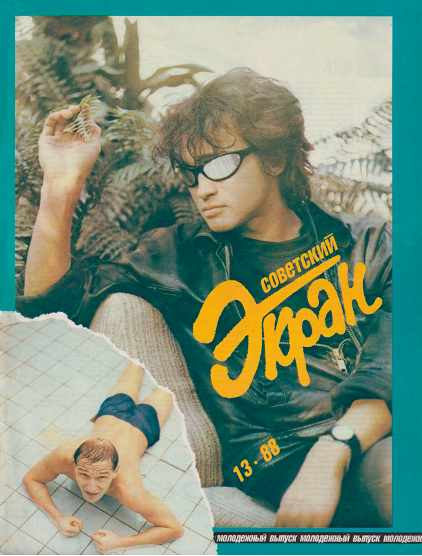Filed Under: Print > Journalism > “Sovetskii ekran” with Tsoi on cover, 1988
“Sovetskii ekran” with Tsoi on cover, 1988

The popularization of rock music in the USSR occurred in large part through collaboration from the film industry. Popular film magazines like Soviet Screen (Sovetskii ekran, 1925-1998), were instrumental in establishing rock musicians as cultural icons. The cover image from Volume 13, from 1988, depicts Kino frontman Viktor Tsoi (1962-1990) and Pyotr Mamonov (1951-2001) of the Moscow-based rock band Zvuki Mu. Both artists appeared in Rashid Nugmanov’s (1954-) 1988 film The Needle (Igla), which cemented Tsoi’s rock stardom and firmly established Mamonov as a serious actor. The musician went on to a successful theater career and to star in Pavel Lungin’s (1949-) drama Taxi Blues (Taksi Bliuz, 1990), which was released to international acclaim and became a classic example of the perestroika-era chernukha aesthetic. Following this success, Mamonov would become Lungin’s cinematic muse, acting in the controversial films The Island (Ostrov, 2006) and Tsar (Tsar’, 2009).
While Tsoi’s potential cinematic trajectory remains fodder for conjecture, Mamonov’s example shows the extent to which the symbiosis between rock music and the cinema industry in the USSR became a productive conduit for post-Soviet visual culture. This issue of Sovetskii ekran thus demonstrates the extent to which the late-Soviet film industry embraced, and became dependent on, underground rock culture as a reliable source of lucrative cinematic content. On page 11, the editors published a poem by the recently deceased Siberian rock musician Aleksandr Bashlachyov (1960-1988), below which they added a plea: “Brothers-cinematographers! We entreat you, make a film about him! The footage exists—there’s not much, but it’s there. Scenes from his astonishing concerts…Make this film!”